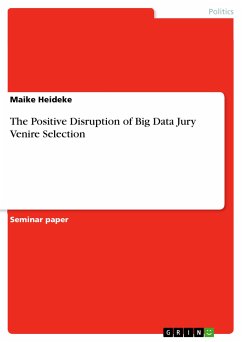Seminar paper from the year 2019 in the subject Politics - Methods, Research, grade: 1,0, University of Hamburg, course: Interdisciplinary Seminar in Politics and Philosophy: Ethics, Politics and Epistemology of Big Data, language: English, abstract: This paper looks at an algorithmically- led decision process that is designed to select an (almost) perfectly demographically representative cross-section for a Jury Venire using Big Data. With the scope of Lepri et al. (2017), this paper identifies that "dark sides" such as privacy violations, informational opacity and discrimination are likely to apply to such a (yet) hypothetical Big Data Jury Venire selection process. Answering the question of how this selection process could be positively disrupted is posed, this paper finds that policies akin to Lepri et al. (2017) would address the majority of the problems identified. Further research will be required to illuminate further potential dark-sides, define more general, positively disruptive policies, as well as to specify policy suggestions.
Dieser Download kann aus rechtlichen Gründen nur mit Rechnungsadresse in A, B, BG, CY, CZ, D, DK, EW, E, FIN, F, GR, HR, H, IRL, I, LT, L, LR, M, NL, PL, P, R, S, SLO, SK ausgeliefert werden.









